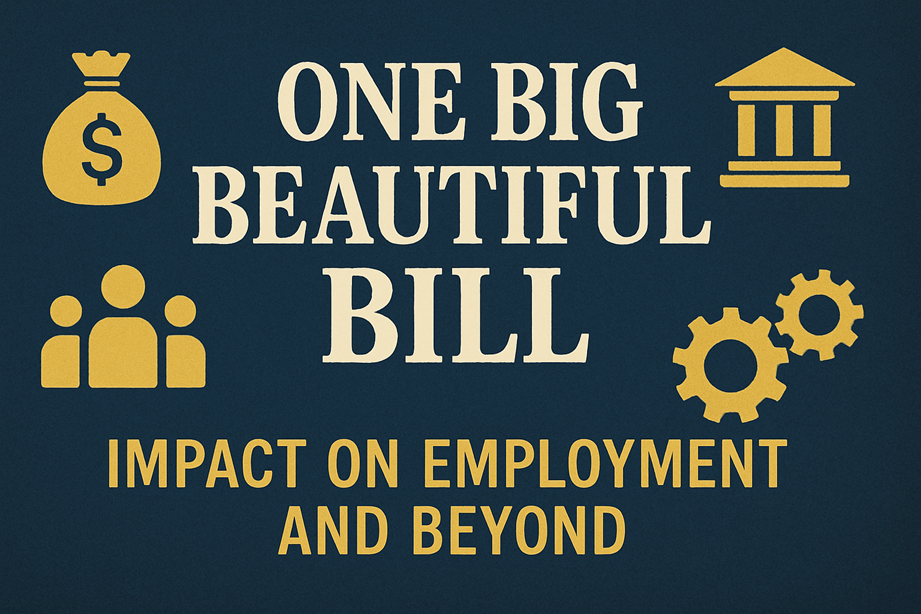More beautiful information to save you money
Bill Fox • August 1, 2025
Below are descriptions of new provisions from the One Big Beautiful Bill Act, signed into law on July 4, 2025, as Public Law 119-21, that go into effect for 2025.
“No Tax on Tips”
New deduction: Effective for 2025 through 2028, employees and self-employed individuals may deduct qualified tips received in occupations that are listed by the IRS as customarily and regularly receiving tips on or before December 31, 2024, and that are reported on a Form W-2, Form 1099, or other specified statement furnished to the individual or reported directly by the individual on Form 4137.
“Qualified tips” are voluntary cash or charged tips received from customers or through tip sharing.
Maximum annual deduction is $25,000; for self-employed, deduction may not exceed individual’s net income (without regard to this deduction) from the trade or business in which the tips were earned.
Deduction phases out for taxpayers with modified adjusted gross income over $150,000 ($300,000 for joint filers).
Taxpayer eligibility: Deduction is available for both itemizing and non-itemizing taxpayers.
Self-employed individuals in a Specified Service Trade or Business (SSTB) under section 199A are not eligible. Employees whose employer is in an SSTB also are not eligible.
Taxpayers must:
include their Social Security Number on the return and
file jointly if married, to claim the deduction.
Reporting: Employers and other payors must file information returns with the IRS (or SSA) and furnish statements to taxpayers showing certain cash tips received and the occupation of the tip recipient.
Guidance: By October 2, 2025, the IRS must publish a list of occupations that “customarily and regularly” received tips on or before December 31, 2024.
The IRS will provide transition relief for tax year 2025 for taxpayers claiming the deduction and for employers and payors subject to the new reporting requirements.
“No Tax on Overtime”
New deduction: Effective for 2025 through 2028, individuals who receive qualified overtime compensation may deduct the pay that exceeds their regular rate of pay – such as the “half” portion of “time-and-a-half” compensation -- that is required by the Fair Labor Standards Act (FLSA) and that is reported on a Form W-2, Form 1099, or other specified statement furnished to the individual.
Maximum annual deduction is $12,500 ($25,000 for joint filers).
Deduction phases out for taxpayers with modified adjusted gross income over $150,000 ($300,000 for joint filers).
Taxpayer eligibility: Deduction is available for both itemizing and non-itemizing taxpayers.
Taxpayers must:
include their Social Security Number on the return and
file jointly if married, to claim the deduction.
Reporting: Employers and other payors are required to file information returns with the IRS (or SSA) and furnish statements to taxpayers showing the total amount of qualified overtime compensation paid during the year.
Guidance: The IRS will provide transition relief for tax year 2025 for taxpayers claiming the deduction and for employers and other payors subject to the new reporting requirements.
“No Tax on Car Loan Interest”
New deduction: Effective for 2025 through 2028, individuals may deduct interest paid on a loan used to purchase a qualified vehicle, provided the vehicle is purchased for personal use and meets other eligibility criteria. (Lease payments do not qualify.)
Maximum annual deduction is $10,000.
Deduction phases out for taxpayers with modified adjusted gross income over $100,000 ($200,000 for joint filers).
Qualified interest: To qualify for the deduction, the interest must be paid on a loan that is:
originated after December 31, 2024,
used to purchase a vehicle, the original use of which starts with the taxpayer (used vehicles do not qualify),
for a personal use vehicle (not for business or commercial use) and
secured by a lien on the vehicle.
If a qualifying vehicle loan is later refinanced, interest paid on the refinanced amount is generally eligible for the deduction.
Qualified vehicle: A qualified vehicle is a car, minivan, van, SUV, pick-up truck or motorcycle, with a gross vehicle weight rating of less than 14,000 pounds, and that has undergone final assembly in the United States.
Final assembly in the United States: The location of final assembly will be listed on the vehicle information label attached to each vehicle on a dealer's premises. Alternatively, taxpayers may rely on the vehicle’s plant of manufacture as reported in the vehicle identification number (VIN) to determine whether a vehicle has undergone final assembly in the United States.
The VIN Decoder website for the National Highway Traffic Safety Administration (NHTSA) provides plant of manufacture information. Taxpayers can follow the instructions on that website to determine if the vehicle’s plant of manufacture was located in the United States.
Taxpayer eligibility: Deduction is available for both itemizing and non-itemizing taxpayers.
The taxpayer must include the Vehicle Identification Number (VIN) of the qualified vehicle on the tax return for any year in which the deduction is claimed.
Reporting: Lenders or other recipients of qualified interest must file information returns with the IRS and furnish statements to taxpayers showing the total amount of interest received during the taxable year.
Guidance: The IRS will provide transition relief for tax year 2025 for interest recipients subject to the new reporting requirements.
Deduction for Seniors
New deduction: Effective for 2025 through 2028, individuals who are age 65 and older may claim an additional deduction of $6,000. This new deduction is in addition to the current additional standard deduction for seniors under existing law.
The $6,000 senior deduction is per eligible individual (i.e., $12,000 total for a married couple where both spouses qualify).
Deduction phases out for taxpayers with modified adjusted gross income over $75,000 ($150,000 for joint filers).
Qualifying taxpayers: To qualify for the additional deduction, a taxpayer must attain age 65 on or before the last day of the taxable year.
Taxpayer eligibility: Deduction is available for both itemizing and non-itemizing taxpayers.
Taxpayers must:
include the Social Security Number of the qualifying individual(s) on the return, and
file jointly if married, to claim the deduction.





